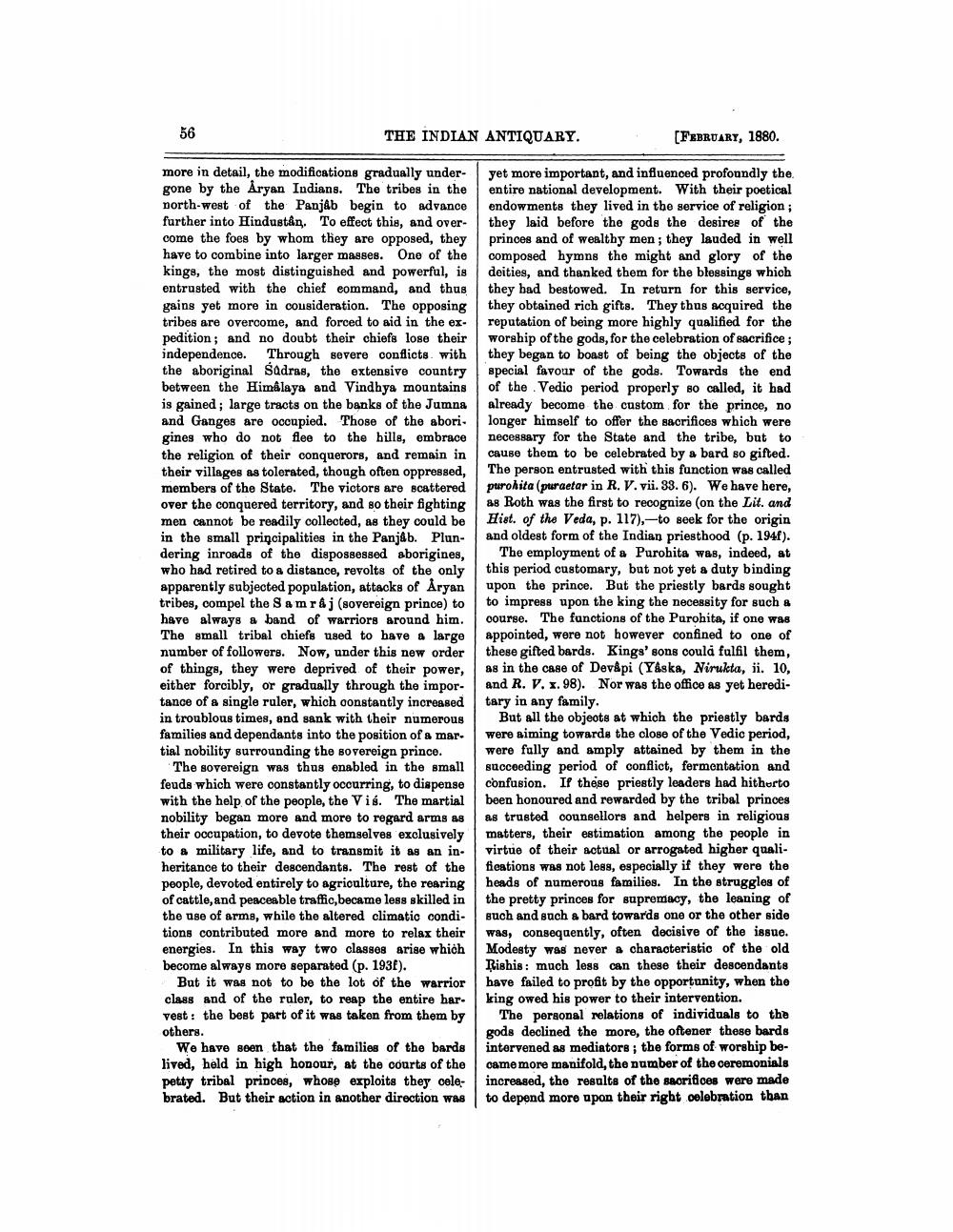________________
56
THE INDIAN ANTIQUARY.
[FEBRUARY, 1880.
more in detail, the modifications gradually under- yet more important, and influenced profoundly the gone by the Aryan Indians. The tribes in the entire national development. With their poetical north-west of the Panjab begin to advance endowments they lived in the service of religion; further into Hindustan. To effect this, and over- they laid before the gods the desires of the come the foes by whom they are opposed, they princes and of wealthy men; they lauded in well have to combine into larger masses. One of the composed hymns the might and glory of the kings, the most distinguished and powerful, is deities, and thanked them for the blessings which entrusted with the chief command, and thus they bad bestowed. In return for this service, gains yet more in cousideration. The opposing they obtained rich gifts. They thus acquired the tribes are overcome, and forced to aid in the ex. reputation of being more highly qualified for the pedition; and no doubt their chiefs lose their worship of the gods, for the celebration of sacrifice; independence. Through severe conflicts with they began to boast of being the objects of the the aboriginal Sadras, the extensive country special favour of the gods. Towards the end between the Himalaya and Vindhya mountains of the Vedio period properly so called, it had is gained ; large tracts on the banks of the Jumna already become the custom for the prince, no and Ganges are occupied. Those of the abori. longer himself to offer the sacrifices which were gines who do not flee to the hills, embrace necessary for the State and the tribe, but to the religion of their conquerors, and remain in cause them to be celebrated by a bard so gifted. their villages as tolerated, though often oppressed, The person entrusted with this function was called members of the State. The victors are scattered purohita (puraetar in R. V. vii. 33. 6). We have here, over the conquered territory, and so their fighting 88 Roth was the first to recognize (on the Lit. and men cannot be readily collected, as they could be Hist. of the Veda, p. 117),-to seek for the origin in the small principalities in the Panjab. Plun- and oldest form of the Indian priesthood (p. 194f). dering inroads of the dispossessed aborigines, The employment of a Purohita was, indeed, at who had retired to a distance, revolts of the only this period customary, but not yet a duty binding apparently subjected population, attacks of Aryan | upon the prince. But the priestly bards sought tribes, compel the samr&i (sovereign prince) toto impress upon the king the necessity for such & have always a band of warriors around him. course. The functions of the Purohita, if one was The small tribal chiefs used to have a large appointed, were not however confined to one of number of followers. Now, under this new order these gifted bards. Kings' sons could fulfil them, of things, they were deprived of their power, as in the case of Dev&pi (Y&ska, Nirukta, ii. 10, either forcibly, or gradually through the impor- and R. V. x. 98). Nor was the office as yet hereditance of a single ruler, which constantly increased tary in any family. in troublons times, and sank with their numerous But all the objects at which the priestly bards families and dependants into the position of a mar. were aiming towards the close of the Vedic period, tial nobility surrounding the sovereign prince. were fully and amply attained by them in the
The sovereign was thus enabled in the small succeeding period of conflict, fermentation and feuds which were constantly occurring, to dispense confusion. If these priestly leaders had hithurto with the help of the people, the Vis. The martial been honoured and rewarded by the tribal princes nobility began more and more to regard arms 88 as trusted counsellors and helpers in religious their occupation, to devote themselves exclusively matters, their estimation among the people in to a military life, and to transmit it as an in. virtue of their actual or arrogated higher qualiheritance to their descendants. The rest of the fications was not less, especially if they were the people, devoted entirely to agriculture, the rearing heads of numerous families. In the struggles of of cattle and peaceable traffic, became less skilled in the pretty princes for supremacy, the leaning of the use of arms, while the altered climatic condi- such and such a bard towards one or the other side tions contributed more and more to relax their was, consequently, often decisive of the issue. energies. In this way two classes arise which Modesty was never a characteristic of the old become always more separated (p. 1938).
Rishis: much less can these their descendants But it was not to be the lot of the warrior have failed to profit by the opportunity, when the class and of the ruler, to reap the entire har. king owed his power to their intervention. vest: the best part of it was taken from them by The personal relations of individuals to the others.
gods declined the more, the oftener these bards We have seen that the families of the bards intervened as mediators; the forms of worship belived, held in high honour, at the courts of the came more manifold, the number of the ceremonials petty tribal princes, whose exploits they cele- increased, the results of the sacrifices were made brated. But their action in another direction was to depend more upon their right oelebration than




